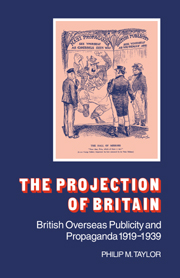Book contents
- Frontmatter
- Contents
- Preface
- Acknowledgements
- Abbreviations
- Introduction
- Part One Publicity and diplomacy, 1919–1939
- Part Two The projection of Britain, 1919–1939
- Part Three Psychological rearmament, 1935–1939
- 5 The BBC foreign-language broadcasts
- 6 The Vansittart Committee for the Co-ordination of British Publicity Abroad
- 7 Propaganda for war
- Conclusion
- Notes
- Select bibliography
- Index
6 - The Vansittart Committee for the Co-ordination of British Publicity Abroad
Published online by Cambridge University Press: 01 October 2009
- Frontmatter
- Contents
- Preface
- Acknowledgements
- Abbreviations
- Introduction
- Part One Publicity and diplomacy, 1919–1939
- Part Two The projection of Britain, 1919–1939
- Part Three Psychological rearmament, 1935–1939
- 5 The BBC foreign-language broadcasts
- 6 The Vansittart Committee for the Co-ordination of British Publicity Abroad
- 7 Propaganda for war
- Conclusion
- Notes
- Select bibliography
- Index
Summary
Early in 1938 British overseas propaganda was about to enter a critical phase of its development. The advancements made in the direction of national projection during the previous three years had undeniably been impressive, but despite the progress now being made by the British Council with the energetic Lord Lloyd at its helm, despite governmental approval for the inauguration of a foreign-language service by the BBC and despite the investigations of the reconstituted Kingsley Wood committee into the deficiencies which still existed in the distribution of British news abroad, there nonetheless remained much work to be done in the cause of psychological rearmament. Hitherto the tendency had been to tackle each individual part of the propaganda problem separately. The Travel Association had been set up to conduct tourist and trade propaganda and the British Council for cultural propaganda, and the BBC had agreed to broadcast news in foreign languages on behalf of the government. In this somewhat spasmodic manner, the official British machinery for conducting propaganda overseas had been gradually built up. It was, perhaps, the only way that progress in this direction could have been made in the face of at times overwhelming opposition from the more traditionally minded elements in Whitehall who could not – or would not – accept the need for such work. Yet there still remained an urgent need to approach the subject in its entirety.
- Type
- Chapter
- Information
- The Projection of BritainBritish Overseas Publicity and Propaganda 1919–1939, pp. 216 - 259Publisher: Cambridge University PressPrint publication year: 1981
- 1
- Cited by



